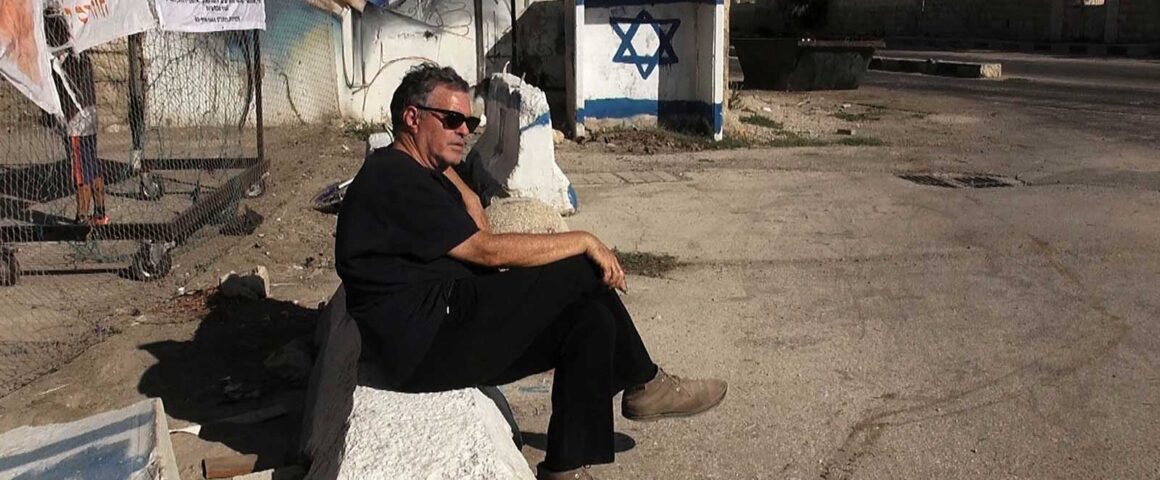“You’re right from your side and I’m right from mine. We’re both just one too many mornings and a thousand miles behind” — Bob Dylan
In the Israeli-French co-production West of the Jordan River, Israeli director Amos Gitai (“Rabin, the Last Day”) returns to the West Bank to interview journalists, politicians, non-profit groups, and ordinary citizens attempting to resolve the seemingly never-ending dispute between the Israelis and the Palestinians. Mainly shot in Hebron, the largest Palestinian city in the West Bank, the film’s subheading “Field Diary Revisited” recalls the 1982 documentary “Field Diary” in which Gitai visited the occupied territories immediately prior to and after the Israeli army’s invasion of Lebanon. Reaction to the film’s criticism of Israel settlers, however, led to Gitai’s self-imposed 10-year exile in France.
West of the Jordan River opens in 1994 when the then 35-year-old Gitai interviews Prime Minister Yitzhak Rabin about the peace process. According to Gitai, Rabin was “a man with a certain simplicity. Even if you disagreed with him, he was the only Israeli political figure who told the truth. He was rare . . . the only leader who sought dialogue, who sought agreement.” Now 22 years after Rabin was assassinated by a Jewish extremist who opposed the Oslo accords, Gitai says “And now . . . we are feeling the lack of a real political figure who wants to move forward, a lack that puts the whole Israeli project in danger.”
He asks, “What can we do? We can make a film. It’s a beginning. You have to be optimistic, and you mustn’t be bitter about your own country because your country is the source of your inspiration.” Though the film is heavily weighted toward an anti-government point of view, Gitai gives space to both sides including the young Israeli foreign affairs minister, Tzipi Hotovely who strongly defends the government’s policy in the occupied areas. An editor from the newspaper “Haaretz,” however, offers a deeply pessimistic comment that if Israel continues to support Jewish settlements in the West Bank and Gaza, it is likely to cross the point of no return and disappear within ten years.
As the film progresses, however, a strong desire for peace and reconciliation emerges through the quiet, thoughtful questions posed by the director. In one scene, “The Parents Circle,” a support group for both Israeli and Palestinian mothers who have lost sons in the conflict, come together to share the personal impact of their loss. Also featured are discussions with the non-profit group “Breaking the Silence” which encourages Israeli military veterans to talk about the harsh reality they have personally encountered in the West Bank. Though many work for reconciliation including those in the non-profit group “B’Tselem,” also known as “The Israeli Information Center for Human Rights in the Occupied Territories,” the culture of revenge and martyrdom runs deep among some Palestinians.
In a heartbreaking moment, a 10-year-old boy tells Gitai that his dream is to blow himself up and become a martyr for Allah so that Allah will tell him about the good work he did during his life. In a more positive scene, Gitai talks with an Israeli settler who was shot in the hip by a would-be terrorist, but who shows sympathy and understanding for the problems of the Palestinians. For those familiar with the issues, West of the Jordan River is a timely reminder of the human cost of the conflict. For those unfamiliar with the circumstances or the political players involved, however, the film does not clarify the issues or offer any background or context.
While Gitai acknowledges that there is intransigence on both sides, dramatized by the circular motion of a carousel going round and round, he neglects to mention that the Palestinians have consistently refused a two-state solution and, even to this day, do not recognize Israel’s right to exist. In the Oscar-nominated 2001 film “Promises” by B.Z. Goldberg, a documentary that looked at the Arab-Israeli conflict from the point of view of seven Israeli and Palestinian children, one Jewish boy asks, “In war both sides suffer, maybe there’s a winner, but what is a winner?” That question is still being asked 16 years later.




'Movie Review: West of the Jordan River (2017)' has no comments